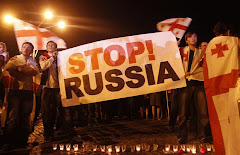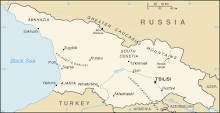The Abkhazia Conflict
Abkhazia is a region of northwestern Georgia on the Black Sea coast. During the Soviet era, Abkhazia was an independent Soviet Socialist Republic until February 1931, when it became an autonomous republic of the Georgian S.S.R. As the Soviet Union began to unravel, tension developed between Georgia and Abkhazia as the Abkhaz began demanding the restoration of the region’s pre-1931 status and the Georgian independence movement became increasingly nationalistic.
Following Georgia’s declaration of independence, armed conflict began in August 1992 when Georgian troops were deployed to Abkhazia. Large-scale hostilities ended after the Abkhaz side broke the ceasefire agreement of July 27, 1993 and captured the Abkhaz capital city of Sukhumi on September 27. Most of the Georgian population of Abkhazia fled or was forcibly expelled as a result of the conflict.
On April 4, 1994 in Moscow, the sides signed a Declaration on Measures for a Political Settlement of the Georgian/Abkhaz Conflict. In this agreement, the parties committed themselves to the strict observance of a cease-fire and to cooperate to ensure the safe, secure and dignified return of people who had fled the area of the conflict. On May 14, 1994 an Agreement on a Cease-Fire and Separation of Forces was signed, also in Moscow. Under this agreement, a demilitarized security zone was created on either side of the Inguri River. A peacekeeping force of the Commonwealth of Independent States (CIS) was deployed to this zone to monitor compliance with the ceasefire agreement. The United National Observer Mission in Georgia was established to monitor compliance with the ceasefire.
In May 1998, fighting broke out between Georgians and Abkhaz in Gali district of Abkhazia, when Georgian partisans attempted to take back part of that district By 1998, several tens of thousands of Georgian internally displaced persons (IDPs) had returned to their former homes in Abkhazia’s Gali district. After days of escalating hostilities culminated in a large-scale Abkhaz sweep operation, upwards of 40,000 Georgians were expelled and some 1,500 houses burned. Since that time, the security situation has remained precarious.
During the conflict, Russia played a leading role as mediator. Since December 1993, the UN has chaired negotiations toward a settlement. The UN mediator is the Special Representative of the Secretary General (SRSG), currently Ambassador Heidi Tagliavini of Switzerland. A "Group of Friends" of the UN Secretary General (consisting of the United States, France, Germany, Russian Federation, United Kingdom,) supports the UN-led peace process. Russia continues to play a special role as facilitator. Under the auspices of the UN, the two sides met in Geneva in November 1997, where they agreed to establish a Coordination Council to resolve practical issues between them. Within the framework of the Council, three working groups were established to deal with security issues, refugees and IDPs, and economic and social problems.
In early 2000, then-UN Special Representative of the Secretary General Dieter Boden and the Group of Friends drafted and informally presented a document to the parties outlining a possible distribution of competencies between the Abkhaz and Georgian representatives, based on a core respect for Georgian territorial integrity. The Abkhaz side, however, has never accepted the paper as a basis for negotiations.
In 2003, a meeting of the Group of Friends in Geneva began what would become a series of talks with the purpose of defining principles for the political settlement of the Georgian-Abkhaz conflict. In early 2004, these UN-sponsored talks between Abkhaz authorities and the Georgian government broke off amid growing tensions between the sides. The standstill continued through the end of the year as the Abkhaz carried out protracted elections for a de facto president. In April 2005, meetings between the parties, represented by the new Georgian government of Mikheil Saakashvili and the new Abkhaz leadership, resumed in Geneva with the Group of Friends.
U.S. Policy
The United States supports the strengthening of Georgia’s territorial integrity through peaceful means. Unilaterally and as a member of the Group of Friends, the U.S. seeks to advance negotiations toward a comprehensive settlement of the conflict, including on Abkhazia’s future status within Georgia and the safe and dignified return of refugees and internally-displaced persons.
Fenomenul Piața Universității 1990 expus de fotojurnaliștii Nic Hanu,
Pascal Ilie Virgil și Victor Roncea la Palatul Suțu și în Cetatea Râșnov.
FOTOGRAFII EXCLUSIVE
-
*Trei fotografi readuc la lumină, după 30 de ani, 52 de imagini ale
Fenomenului Piața Universității 1989-1990.*
După prezentarea acestora pe simezele desch...
Acum 3 ani

